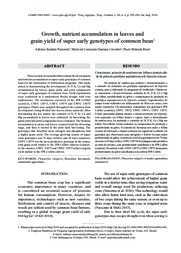Growth, nutrient accumulation in leaves and grain yield of super early genotypes of common bean.
Growth, nutrient accumulation in leaves and grain yield of super early genotypes of common bean.
Author(s): NASCENTE, A. S.; CARVALHO, M. da C. S.; ROSA, P. H.
Summary: There is a lack of researches that evaluate the development and nutrient accumulation in super early genotypes of common bean for the elaboration of fertilization programs. This study aimed at characterizing the development; N, P, K, Ca and Mg accumulation by leaves; grain yield; and yield components of super early genotypes of common bean. Field experiments were conducted in a randomized blocks design, with four replications. The treatments consisted of the IPR Colibri (control), CNFC 15873, CNFC 15874 and CNFC 15875 genotypes. Plants were sampled throughout the common bean development, being divided into leaves, stems and pods. After determining the dry matter, the contents of N, P, K, Ca and Mg accumulated in leaves were estimated. At harvesting, the grain yield and yield components were evaluated. The biomass accumulation in stems and leaves occurred until the flowering stage, and then it started in the pods until harvesting. The genotypes that absorbed more nitrogen and phosphorus had a higher grain yield. The average growing season of super early genotypes was 70 days (winter) and 63 days (summer). CNFC 15874 was the most productive genotype in the winter, with grain yield similar to the IPR Colibri cultivar (control). In the summer, CNFC 15873 and CNFC 15875 achieved grain yield similar to the IPR Colibri cultivar.
Publication year: 2016
Types of publication: Journal article
Unit: Embrapa Rice & Beans
Keywords: Agricultura sustentável, Cerrado, Feijão, Genótipo, Phaseolus vulgaris
Observation
Some of Embrapa's publications are published as ePub files. To read them, use or download one of the following free software options to your computer or mobile device. Android: Google Play Books; IOS: iBooks; Windows and Linux: Calibre.
Access other publications
Access the Agricultural Research Database (BDPA) to consult Embrapa's full library collection and records.
Visit Embrapa Bookstore to purchase books and other publications sold by Embrapa.

